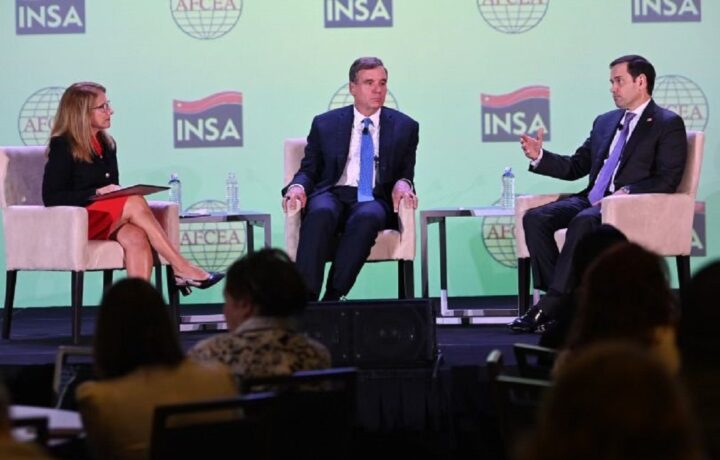How do you thwart spying when some of the most potentially threatening spyware has been voluntarily downloaded in the U.S. more than 210 million times?
The complexity of the threat landscape and the great need for industry and government partnerships to create date awareness and insights was a key focus of the Intelligence and National Security Summit hosted by Intelligence and National Security Alliance (INSA) and AFCEA and taking place in National Harbor, MD, this week.
“In 2023 national security is not the country with the most tanks, ships, and planes,” emphasized Sen. Mark Warner, Chair of Senate Select Committee on Intelligence (SSCI), speaking on a panel with SSCI Vice Chair Marco Rubio and hosted by Letitia Long, Chairman of the Board of INSA.
There are a number of realms today – from semiconductors to hypersonic weapons to AI – where the U.S. faces real challenges and competition from adversaries, specifically Russia and China. But rather than looking at the threats as areas in need of regulation, Sen. Rubio emphasized the opportunities within technologies like AI.
“I don’t think there has been any innovation in U.S. history we have contained,” said Rubio, who emphasized that at its best AI empowers Americans to do what they’re already doing – better and faster. Rubio also said that at its worst, AI has a significant opportunity to displace people from their jobs. The shift that disrupted the middle class of the past will today affect those making $300-400,000 a year, said Rubio.
Counterintelligence Bytes the Dust
When it comes to the counterintelligence landscape, the threat of China can’t be overstated. Warner emphasized their “unlimited computing power and smart people.” And policies and ideologies that set them squarely against U.S. interests. The work has been done to educate U.S. businesses about the threats of doing business in and with China, but both Rubio and Warner noted there is much more that needs to be done to protect U.S. assets, interests, and keep U.S. based companies from pursuing their own bottom lines above protecting national security.
Warner noted there was a growing awareness of U.S. vulnerabilities, but also unprecedented scale brought about by China. The country’s ByteDance TikTok app is just one example. And the issue with TikTok isn’t its content, it’s its capacity for influence.
“I don’t think the booty dances on Tiktok are going to end the Republic,” said Rubio. But the bigger issue is the U.S. inability to prevent Americans from downloading and pursuing the app – despite the clear counterintelligence risks.
Apps of influence and AI combine to create a particularly fraught environment.
But while the risks of disinformation and misinformation are real and proven, Rubio highlighted a positive example – Sweden – where social influencing attempted to prevent citizens from supporting joining NATO, but failed due to the sophistication of the audience.
“People are learning through time and experience,” said Rubio. “It is a challenge, predominately in a time of conflict where you can take internal fractures in a country that make it unwilling to engage on its natural interest…AI can generate so much, and target it so well – you undermine the ability of a country.”
But while there is much to be discouraged about in the realm of counterintelligence, the Ukrainian experience is one offering both lessons and potential opportunity. “The Ukrainian experience is something China is going to look at,” emphasized Warner. The unity of sanctions across the European community is something that likely came as a surprise, along with the efforts of the Ukrainian intelligence community in using unconventional means to take advantage of the full information space – including a number of tactics that wouldn’t fall under any classified or traditional playbook.
And while much can be made of the fractures in both congress and around the IC, Rubio and Warner’s remarks emphasized that while there are key areas of disagreement, there are also key areas of alignment and agreement. Perhaps the most central being that while the challenges America faces are significant, they still place their trust in – and bet on – America.


